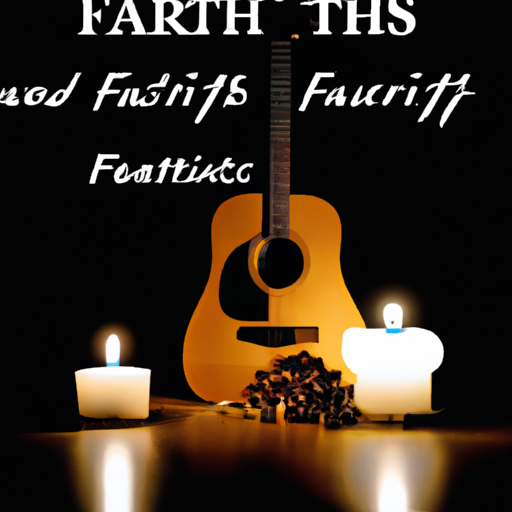Imagine being able to take timeless verses from the Bible and turn them into beautiful worship songs that touch the hearts of believers around the world. In this article, we explore the fascinating world of songwriters who have unlocked the secret of transforming Bible verses into uplifting melodies. From Psalm 98:4-6 to Psalm 33:2-3 and Psalm 30:4, these talented individuals have found inspiration and guidance within the pages of scripture, creating songs that not only inspire, but also deepen our connection with God. Step into the world of transformative melodies and discover the power of worship songs directly from Bible verses.
Understanding the Power of Worship Songs

1.1 The Role of Worship Songs in the Christian Faith
Worship songs play a crucial role in the Christian faith, serving as a powerful tool for believers to express their love, adoration, and reverence for God. These songs have the ability to connect individuals with the divine and create a space for intimate communion with the Creator. They provide a way to give thanks, seek guidance, and find solace in times of joy or hardship. Through worship songs, believers can not only express their own faith, but also join together as a community to worship and glorify God.
1.2 How Worship Songs Impact the Worship Experience
Worship songs have a profound impact on the worship experience, creating an atmosphere that is conducive to encountering the presence of God. They have the power to uplift and inspire, invoking a sense of awe and reverence. The melodies and lyrics of worship songs have the ability to open hearts, stir emotions, and bring individuals into a deeper state of worship. They allow worshippers to connect with the divine on a personal level, creating a space for reflection, repentance, and spiritual renewal.
1.3 The Significance of Bible Verses in Worship Songs
Bible verses hold great significance in worship songs. They serve as the foundation and inspiration for the lyrics and melodies that are crafted by songwriters. By incorporating biblical truths and messages into worship songs, composers are able to reinforce the teachings of Scripture and help worshippers engage with the Word of God in a meaningful way. Bible verses in worship songs not only aid in memorization and meditation of Scripture, but also provide a spiritual anchor, grounding believers in their faith and pointing them towards the heart of God.
2. Unpacking Psalm 98:4-6
2.1 Analyzing the Context and Meaning of Psalm 98:4-6
Psalm 98:4-6 is a powerful passage that speaks of praising and worshiping God through music and song. In this section of the psalm, the psalmist encourages the use of various musical instruments such as the harp, lyre, and trumpets to joyfully proclaim the Lord’s praises. It emphasizes the importance of celebrating God’s salvation and righteousness, calling for a joyful noise to be made unto the Lord.

2.2 Drawing Inspiration from the Verses
Songwriters can draw inspiration from Psalm 98:4-6 by reflecting on the themes of joy, praise, and musical celebration. The vivid imagery and exuberant language used in these verses can inspire the creation of uplifting and spirited worship songs. By meditating on the deep meaning and emotions conveyed in the passage, songwriters can craft lyrics and melodies that resonate with the hearts of worshippers and evoke a sense of awe and reverence towards God.
2.3 Crafting Melodies and Lyrics Based on the Verses
To craft worship songs based on Psalm 98:4-6, songwriters can explore various musical styles and arrangements that capture the joyful and celebratory nature of the passage. Melodies can be composed to reflect the exultation and triumph found within the verses, while lyrics can focus on praising God’s salvation and righteousness. By carefully weaving together words and melodies, songwriters can create songs that inspire worshippers to rejoice and offer their heartfelt worship to the King of kings.
3. Exploring Psalm 33:2-3
3.1 Decoding the Message of Psalm 33:2-3
Psalm 33:2-3 invites believers to praise the Lord with music and song, urging them to make melody to Him with instruments of ten strings and the harp. The psalmist encourages the use of skillful and joyful playing to worship God, emphasizing that singing a new song of praise is a fitting response to His faithfulness and goodness. This passage highlights the power of music as a means of expressing gratitude and celebrating the works of the Lord.
3.2 Finding Musical and Lyrical Inspiration in the Verses
Songwriters can find musical and lyrical inspiration in Psalm 33:2-3 by focusing on themes of praise, gratitude, and the newness of God’s mercies. The mention of specific instruments suggests a vibrant and energetic musical arrangement, while the call for skillful playing encourages songwriters to pursue excellence in their craft. Through meditation on the passage, songwriters can tap into the joyful and celebratory spirit found in the verses and translate it into engaging and heartfelt worship songs.

3.3 Techniques for Translating the Verses into Worship Songs
Translating Psalm 33:2-3 into worship songs requires careful consideration of both the musical and lyrical elements. Songwriters can create melodies that evoke a sense of joy and gratitude, using lively rhythms and uplifting chord progressions. The lyrics should reflect the themes of praise and worship, emphasizing God’s faithfulness and the blessings of His goodness. By incorporating these elements, songwriters can create worship songs that resonate with congregations, leading them into a deeper experience of praise and adoration.
4. Delving into Psalm 30:4
4.1 Examining the Context and Meaning of Psalm 30:4
Psalm 30:4 is a verse that speaks of giving thanks to the Lord and praising His holy name. The psalmist acknowledges that God’s anger is but for a moment, while His favor and grace last a lifetime. This verse highlights the importance of expressing gratitude and praise to God, acknowledging His faithfulness and steadfast love amidst life’s challenges and difficulties.
4.2 Extracting Themes and Motifs for Worship Songs
Songwriters can extract themes of gratitude, praise, and faithfulness from Psalm 30:4. By focusing on these themes, songwriters can craft worship songs that express thanksgiving for God’s enduring love and unending favor. The verse also provides an opportunity to explore the tension between God’s momentary anger and His everlasting grace, allowing songwriters to create songs that reflect on the redemption and salvation found in God’s character.
4.3 Conveying the Emotions of the Verses Through Music and Lyrics
To convey the emotions found in Psalm 30:4, songwriters can use a combination of musical and lyrical techniques. Melodies that evoke a sense of heartfelt gratitude and joy can be composed, while lyrics that express appreciation and trust in God’s faithfulness can be crafted. By carefully selecting the right chords, dynamics, and vocal arrangements, songwriters can bring out the emotional depth of the verses, enabling worshippers to connect with God on a deeply personal and emotional level.
5. Tips and Techniques for Songwriters

5.1 Choosing the Right Bible Verses for Worship Songs
When selecting Bible verses for worship songs, songwriters should consider the message and themes they want to convey. It is important to choose verses that align with the overall vision and purpose of the song, and also resonate with the intended audience. By carefully studying and selecting verses, songwriters can ensure that their worship songs accurately reflect the message of Scripture and inspire worshippers.
5.2 Understanding Song Structure and Flow
Understanding song structure and flow is essential for effective worship songwriting. Songwriters should consider the typical verse-chorus-bridge format, and how it can be used to convey the intended message of the song. By carefully arranging sections of the song and ensuring a cohesive flow, songwriters can create a musical journey that engages listeners and enables them to connect deeply with the lyrics and themes.
5.3 Balancing Creativity with Faithfulness to the Scripture
Songwriters must strike a balance between their creative expression and faithfulness to the Scripture. While creativity is important in order to craft unique and engaging worship songs, it is crucial to ensure that the lyrics accurately reflect the teachings of the Bible. Songwriters should seek guidance from trusted mentors, study the context and meaning of the chosen Bible verses, and pray for discernment to create songs that honor and glorify God.
6. Case Studies: Worship Songs Transformed from Bible Verses
6.1 A Closer Look at Popular Worship Songs Inspired by Bible Verses
In this section, we will explore popular worship songs that have been inspired by specific Bible verses. We will examine the lyrics and melodies of these songs in the context of the chosen verses, highlighting how the songwriters successfully transformed biblical truths and messages into engaging and impactful worship songs.

6.2 Analyzing the Songwriting Process Behind Each Song
We will dive into the songwriting process behind each worship song, exploring how songwriters approached the task of transforming Bible verses into lyrics and melodies. We will analyze the creative choices made by the songwriters and discuss how they effectively captured the essence of the chosen verses in their songs.
6.3 How These Songs Impact Worshipers’ Spiritual Lives
Lastly, we will delve into the impact that these worship songs have on the spiritual lives of worshippers. We will examine the ways in which these songs facilitate deeper worship, inspire personal reflection, and foster a sense of connection with God. By studying the impact of these songs, we can gain a deeper understanding of the transformative power of worship songs infused with Bible verses.
7. Overcoming Challenges in Transforming Bible Verses into Worship Songs
7.1 Addressing Potential Theological Concerns
Transforming Bible verses into worship songs can present theological challenges. Songwriters must ensure that the chosen verses are interpreted and presented accurately, without introducing any theological errors or misrepresentations. It is important to consult trusted theological sources, seek input from pastoral leaders, and be open to constructive feedback in order to address potential concerns and uphold theological integrity.
7.2 Navigating Copyright and Legal Considerations
Songwriters must also be aware of copyright and legal considerations when using Bible verses in worship songs. While Bible verses themselves cannot be copyrighted, the melodies and lyrics created by songwriters are subject to copyright laws. It is important to obtain necessary permissions, properly attribute the verses, and adhere to copyright regulations to ensure that the worship songs can be legally used and distributed.
7.3 Overcoming Writer’s Block and Finding Inspiration
Finding inspiration and overcoming writer’s block can be a challenge for songwriters. When faced with difficulties in transforming Bible verses into worship songs, songwriters can engage in activities that foster creativity and spiritual growth, such as prayer, meditation, and studying Scripture. Seeking input from fellow songwriters, participating in collaborative projects, or attending songwriting workshops can also provide fresh perspectives and inspiration.
8. The Impact of Worship Songs Infused with Bible Verses
8.1 Exploring the Spiritual Depth and Meaning of Worship Songs
Worship songs infused with Bible verses have a profound impact on the spiritual lives of worshippers. They provide a means of expressing and deepening faith, allowing individuals to connect with and respond to God’s Word. These songs evoke emotions, stir the soul, and create a space for worship that is both personal and communal. By resonating with the deep spiritual longings of worshippers, these songs foster a sense of spiritual depth and meaning.
8.2 How Worship Songs Aid in Memorization and Meditation of Scripture
Incorporating Bible verses into worship songs aids in the memorization and meditation of Scripture. The repetition of verses through music enhances memorization, enabling worshippers to internalize God’s Word and carry it with them throughout their daily lives. By singing and meditating on these verses, individuals can deepen their understanding of Scripture and draw closer to the heart of God.
8.3 Connecting Worshipers with the Heart of God
Worship songs infused with Bible verses have the power to connect worshippers with the heart of God. Through the lyrics and melodies, these songs serve as a conduit for the Holy Spirit to move and minister to individuals. They create an environment of worship that allows for a personal encounter with God, inviting worshippers to lay down their burdens, seek His presence, and experience His love and grace in a profound and transformative way.
9. Levelling Up your Songwriting Skills
9.1 Seeking Feedback and Collaboration
In order to level up songwriting skills, it is important for songwriters to seek feedback and engage in collaboration. Constructive criticism from trusted mentors and fellow songwriters can offer valuable insights and help refine the craft. Collaborating with others can also provide fresh perspectives, new ideas, and opportunities for growth. Songwriters should remain open to feedback, embrace a growth mindset, and actively pursue opportunities for collaboration.
9.2 Improving Musical and Lyrical Techniques
Continual improvement of musical and lyrical techniques is essential for songwriters. Developing a strong foundation in music theory, vocal techniques, and instrumental proficiency can greatly enhance the ability to craft compelling and impactful worship songs. Additionally, studying the works of experienced songwriters, attending workshops and conferences, and seeking inspiration from a variety of musical genres can broaden creative horizons and lead to growth in artistic expression.
9.3 Investing in Worship Songwriting Resources and Education
Investing in worship songwriting resources and education can provide songwriters with the necessary tools and knowledge to excel in their craft. There are numerous books, online courses, and workshops available that specifically cater to the unique challenges and techniques of worship songwriting. By dedicating time and resources to continuous learning and growth, songwriters can enhance their skills, expand their creativity, and make a lasting impact with their worship songs.
10. Embracing the Songwriters’ Role in Worship
10.1 Recognizing the Influence and Responsibility of Songwriters
As worship songwriters, it is important to recognize the influence and responsibility that comes with the role. Songwriters have the ability to shape the worship experience of individuals and congregations, impacting their spiritual lives and fostering a deep connection with God. This recognition should serve as a reminder to approach the task with humility, reverence, and a commitment to seeking and reflecting the heart of God in their songs.
10.2 Leading Worship Through Songwriting
Songwriters have a unique opportunity to lead worship through their songs. By crafting lyrics that inspire prayer, reflection, and connection with God, songwriters can guide worshippers into a deeper experience of worship. The responsibility of leading worship requires intentional thoughtfulness in the choice of words, melodies, and arrangements. By leading through songwriting, songwriters become catalysts for a transformative worship experience.
10.3 Encouraging Congregational Participation and Spiritual Growth
Finally, songwriters should strive to encourage congregational participation and spiritual growth through their worship songs. By creating songs that are accessible, singable, and relatable, songwriters can foster a sense of unity and engagement within the worshiping community. By incorporating biblical truths and messages that resonate with individuals on a personal level, songwriters can facilitate spiritual growth and inspire a deepening relationship with God.








